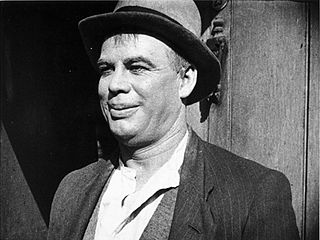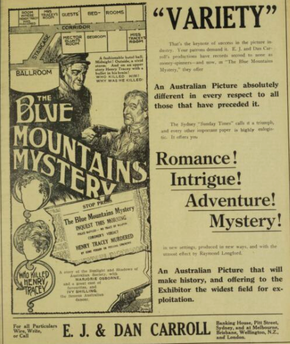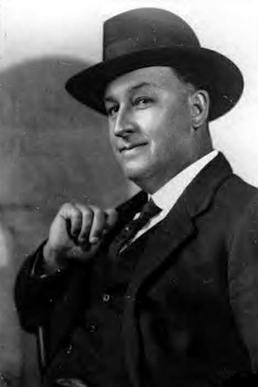Related Research Articles

The Sentimental Bloke is a 1918 Australian silent film based on the 1915 verse novel The Songs of a Sentimental Bloke by C. J. Dennis. Produced and directed by Raymond Longford, the film stars Arthur Tauchert, Gilbert Emery, and Lottie Lyell, who also co-wrote the film with Longford.
Efftee Studios was an early Australian film and theatre production studio, established by F.W. Thring in 1930. It existed until Thring's death in 1935. Initially Efftee Films was based in Melbourne and used optical sound equipment imported from the US.

Cinesound Productions Pty Ltd was an Australian feature film production company. Established in June 1931, Cinesound developed out of a group of companies centred on Greater Union Theatres that covered all facets of the film process, from production to distribution and exhibition. Cinesound Productions established a film studio as a subsidiary of Greater Union Theatres Pty Ltd based on the Hollywood model. The first production was On Our Selection (1932), which was an enormous financial success.

The Songs of a Sentimental Bloke is a verse novel by Australian poet and journalist C. J. Dennis. Portions of the work appeared in The Bulletin between 1909 and 1915, the year the verse novel was completed and published by Angus & Robertson. Written in the rough and comical Australian slang that was Dennis' signature style, the work became immensely popular in Australia, selling over 60,000 copies in nine editions within the first year of publication.

The Blue Mountains Mystery is a lost 1921 Australian silent film directed by Raymond Longford and co-directed by Lottie Lyell.
His Royal Highness is a 1932 Australian musical film directed by F. W. Thring, also known as His Loyal Highness, starring George Wallace in his feature film debut. It was the first Australian film musical.

Raymond Longford was a prolific Australian film director, writer, producer, and actor during the silent era. Longford was a major director of the silent film era of the Australian cinema. He formed a production team with Lottie Lyell. His contributions to Australian cinema with his ongoing collaborations with Lyell, including The Sentimental Bloke (1919) and The Blue Mountains Mystery (1921), prompted the Australian Film Institute's AFI Raymond Longford Award, inaugurated in 1968, to be named in his honour.
Arthur Embery Higgins was a pioneering Australian cinematographer known for his use of trick photography during the silent era. His ongoing collaborations with director Raymond Longford include The Sentimental Bloke (1919) and The Blue Mountains Mystery (1921). He briefly turned to directing with Odds On (1928) however returned to cinematography in 1931 for the remainder of his career.
Harmony Row is a 1933 Australian musical comedy directed by F. W. Thring and Raymond Longford and starring popular stage comedian George Wallace. It marked the film debut of Bill Kerr.
A Ticket in Tatts is a 1934 musical comedy film starring popular stage comedian George Wallace as an accident-prone stablehand. It was the last of three films Wallace made for F. W. Thring.

Francis William Thring III, better known as F. W. Thring, was an Australian film director, producer, and exhibitor. He has been credited with the invention of the clapperboard.
Diggers is a 1931 Australian comedy film produced and directed by F. W. Thring starring popular stage comedian Pat Hanna. It was the first feature film from both men.
Diggers in Blighty is a 1933 Australian film starring and directed by Pat Hanna. Hanna decided to direct this film himself after being unhappy with how F. W. Thring had handled Diggers (1931).

The Streets of London is a 1934 Australian film directed by F. W. Thring. It was a filmed version of a play by Dion Boucicault which Thring had produced on stage the previous year. It was the last film made by Efftee Film Productions – Thring ceased production afterwards with the aim of resuming it later but died in 1936 before he had the chance.
Clara Gibbings is a 1934 Australian film directed by F.W. Thring about the owner of a London pub who discovers she is the daughter of an earl. It was a vehicle for stage star Dorothy Brunton.
Ginger Mick is a 1920 Australian silent film directed by Raymond Longford based on The Moods of Ginger Mick by C. J. Dennis, which had sold over 70,000 copies. It is a sequel to The Sentimental Bloke (1919) and is considered a lost film.
The Dinkum Bloke is a 1923 Australian silent film directed by Raymond Longford. Despite the title and the presence of Arthur Tauchert and Lottie Lyell in the cast, the film is not a direct sequel to The Sentimental Bloke (1919) or Ginger Mick (1920).

The Haunted Barn is a short 1931 Australian comedy film produced by F.W. Thring directed by Gregan McMahon. It was one of the first productions by Thring's Efftee Studios. The film was produced to support of the feature Diggers (1931) and shown on the same bill.
A Co-respondent's Course is a short 1931 Australian film. The screenplay was written by Montague Grover (1870–1943), an experienced journalist. The film was the first film made by Efftee Studios, a production company owned by F.W. Thring, the first Australian narrative film to be completed with an optical soundtrack and part of the first all-Australian full-length unit programme to be screened in Australia.
Southern Cross Feature Film Company was a short lived film production company that made some of Australia's most famous silent films, mostly directed by Raymond Longford. One of the key figures behind it was Sir David Gordon.
References
- ↑ "AUSTRALIAN FILMS". The Sunday Times . Perth: National Library of Australia. 21 June 1931. p. 6. Retrieved 5 January 2012.
- 1 2 "Counting the Cash in Australian Films"', Everyones 12 December 1934 p 19-20
- 1 2 'Counting the Cash in Australian Films', Everyones 12 December 1934 p 19 quoted in Fitzpatrick p179
- 1 2 "Film Industry In Australia". The News . Adelaide: National Library of Australia. 11 June 1935. p. 4. Retrieved 17 March 2015.
- ↑ Fitzpatrick p 174
- ↑ "Australian Talkies". The Sunday Times . Perth: National Library of Australia. 9 August 1931. p. 6. Retrieved 7 August 2012.
- ↑ "BILLY COOK'S WIFE STARRED IN FIRST TALKIE". The Sunday Times . Perth: National Library of Australia. 13 December 1953. p. 29. Retrieved 8 August 2012.
- ↑ "Raymond Longford", Cinema Papers, January 1974 p51
- ↑ Fitzpatrick p 173
- ↑ Fitzpatrick p 178
- ↑ ""THE SENTIMENTAL BLOKE."". The West Australian . Perth: National Library of Australia. 27 May 1932. p. 20. Retrieved 5 January 2012.
- ↑ ""FILM QUOTA"". The Argus . Melbourne: National Library of Australia. 20 August 1934. p. 8. Retrieved 4 August 2012.
- ↑ "AUSTRALIAN FILMS". The Argus . Melbourne: National Library of Australia. 6 January 1934. p. 20. Retrieved 5 April 2012.
- ↑ ""SENTIMENTAL BLOKE."". Townsville Daily Bulletin . Qld.: National Library of Australia. 30 March 1933. p. 6. Retrieved 8 August 2012.
- ↑ "AUSTRALIAN FILMS". The West Australian . Perth: National Library of Australia. 5 May 1933. p. 3. Retrieved 8 August 2012.
- Fitzpatrick, Peter, The Two Frank Thrings, Monash University, 2012